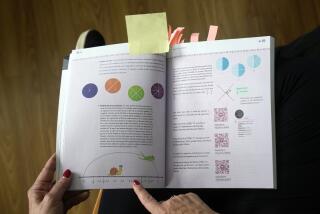School Team: Internet Pages, Textbooks
- Share via
PHILADELPHIA — When history teacher Jim Masker taught a recent lesson on the events surrounding the 1854 Kansas-Nebraska Act, he guided his students through an online account with colorful images, a virtual tour of period buildings and a chat session with a slavery expert. A textbook was nowhere to be found.
“Textbooks are really just two dimensional and flat, but this is so much more,” said Masker of Santa Barbara. “This isn’t saying that books are going by the wayside. [The Internet] just provides so much more than I could ever provide access to and my students’ parents could ever afford.”
Educators are looking more to the Internet for gee-whiz curricula, whether it is to supplement textbooks or abandon them altogether.
“We have the technology here at this school. Why not use it?” said Carolyn Grossi, an eighth-grade humanities teacher in Cherry Hill, N.J. “I think textbooks are limited. With the Internet, there’s no teacher’s guide telling me what to do, so I feel like me and my students have the sky as our limit as far as learning.”
While analysts say Internet-based lessons do not pose a threat to the $3.3 billion elementary and secondary textbook industry, it is causing publishers to think differently.
Publisher Holt, Rinehart and Winston recently announced a partnership with the National Science Teachers Association that links relevant Web sites with the pages of science textbooks. By using special codes placed in textbook margins, students can access supplementary materials through an Internet site.
The textbook giants “have the strength of being a proven brand that’s recognized by teachers; most other companies that don’t have that probably won’t survive,” said Margaret Sherry, spokeswoman for Boston-based Houghton Mifflin Co., another of the industry’s leading publishers.
One company that has found early success is BeyondBooks.com, which was formed by the Ardmore, Pa.-based New Forum Publishers Inc. in 1998. About 60 schools across the nation are using the company’s online textbooks either as their only text or as a supplement for classes like literature, social studies and history.
Founder Jim Cassano, former director of the Independence Hall Association educational Web site in Philadelphia, said he was often inundated with requests from teachers looking for more sites for their students.
“There was a real hunger out there,” he said.
Before turning to the Web site, Masker said he would spend hours in front of his computer, frustrated with having to sort through ads, bad information and pornography while trying to find Web sites for the next day’s lessons.
At BeyondBooks.com, he found an entire U.S. history textbook online, plus original historical documents, newspaper articles, hundreds of primary sources, electronic photo albums and even audio clips of historical interviews.
“I was instantly awed by what I saw there,” he said.
The site is offered free to schools. In return, the company asks teachers to participate in usage studies. By the fall, the company expects to charge schools $4 per subject per student.
While BeyondBooks.com offers entire online texts for middle and high school students, other companies are offering online textbooks geared toward very specific areas of studies, such as the online animated genetics primer by the DNA Learning Center in New York.
“The era of the textbook being the primary vehicle for passing along information has reached its peak,” said John McLaughlin, founder of Education Industry Group, a South Dakota company that researches education for public schools and private companies. “But I don’t think textbooks will become an endangered species. They will always be there for generations to come.”
That kind of survival is based on how fast textbook publishers keep up with the changing demands of school education, McLaughlin said.
In the last five years, publishers have tried to include online supplements for teachers, analysts say. And with statistics showing that elementary and secondary textbook sales are continuing to rise, publishers have not lost hope.
Companies like Houghton Mifflin say they are finding it easy to create free Internet supplements for those who adopt their textbooks.
“The (traditional) publishers have the content and the reputation,” said Rudolph Hokanson, an analyst with CIBC World Markets Corp. in New York.
“How much does a teacher want to gamble on an unproven content provider? It’s very hard to break in,” said Hokanson, who follows the industry. “You can do it with supplemental material in order to enrich the experience. But that’s different than trying to put a textbook on the screen.”
Teachers agree the Internet has its share of problems.
Some Web addresses that are published in textbooks are no longer good by the time students receive the books. Other times, students cannot access the Web because Internet servers are down. And there is the issue of schools not having computers for each student.
“There’s some things about a book that can’t be beat,” said Paul LeBlanc, an expert on Internet-based education and president of Marlboro College in Vermont. “They’re portable, inexpensive, and most people say they prefer to read text on printed page rather than on computer screen anyway.
“Let’s leave to books to do what they do best, and integrate other media to take advantage of what books don’t do well, like graphics and audio,” LeBlanc said.
But students who have grown up with computers and the Internet have found the shift to Internet textbooks easy and attractive.
“Having just a book is so 1900s,” said 14-year-old Chris Barth of Cherry Hill, N.J. “This is like the 21st century now.”
More to Read
Sign up for our Book Club newsletter
Get the latest news, events and more from the Los Angeles Times Book Club, and help us get L.A. reading and talking.
You may occasionally receive promotional content from the Los Angeles Times.







